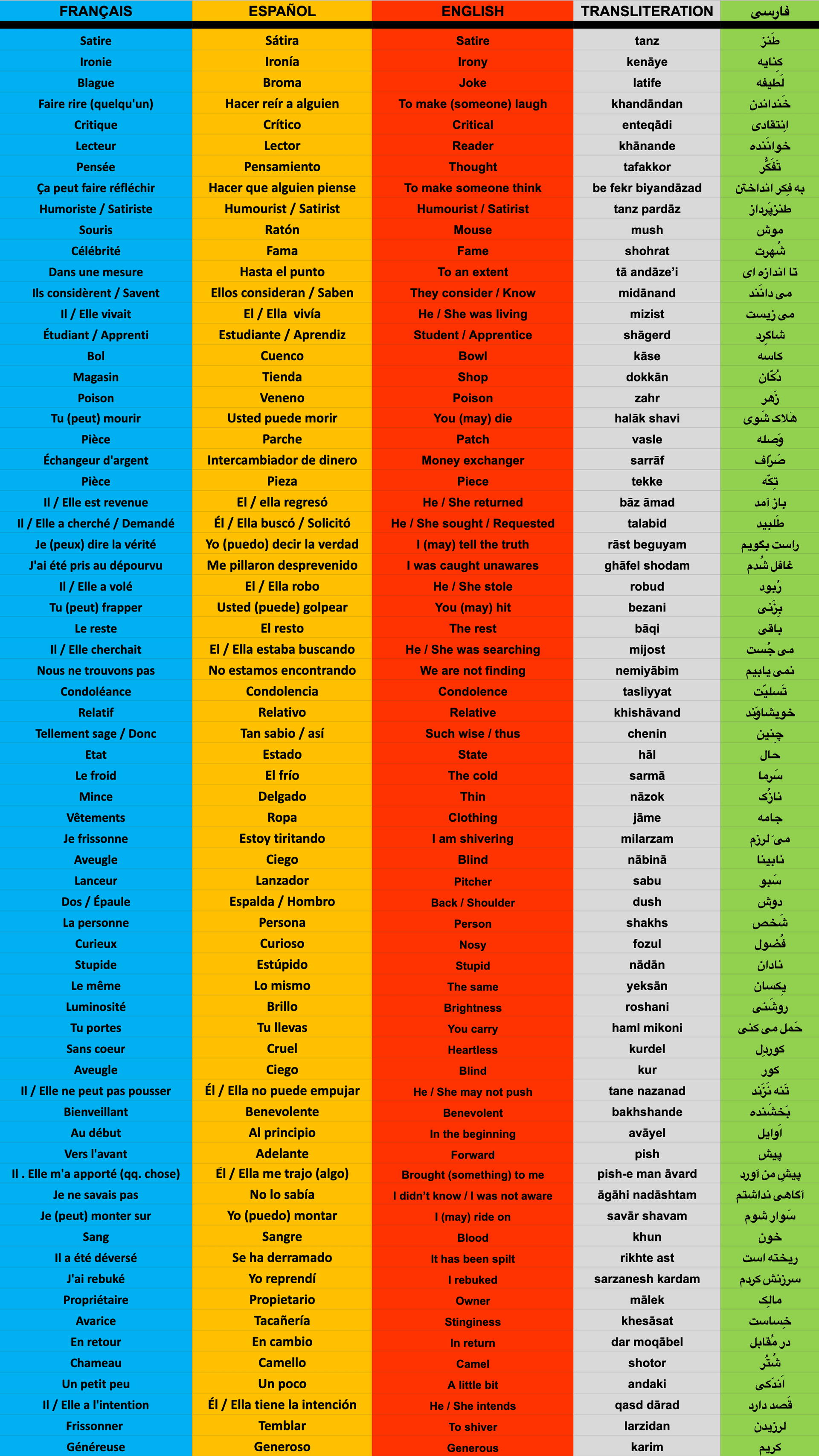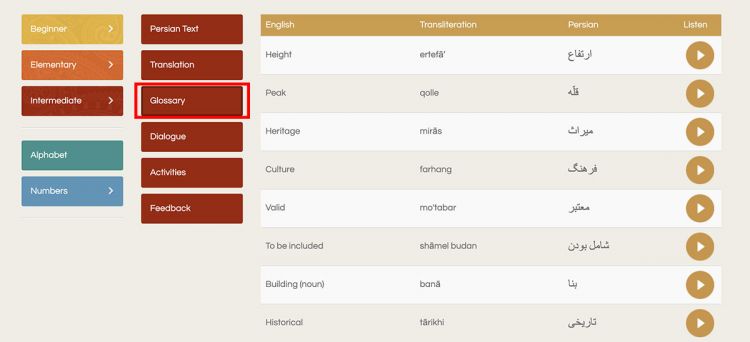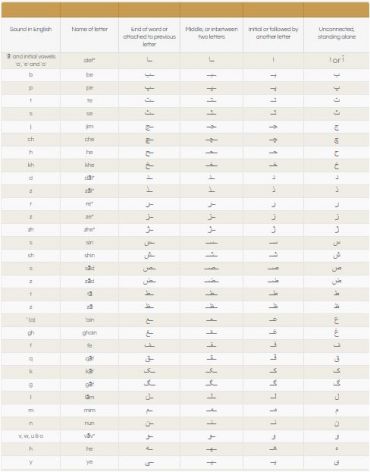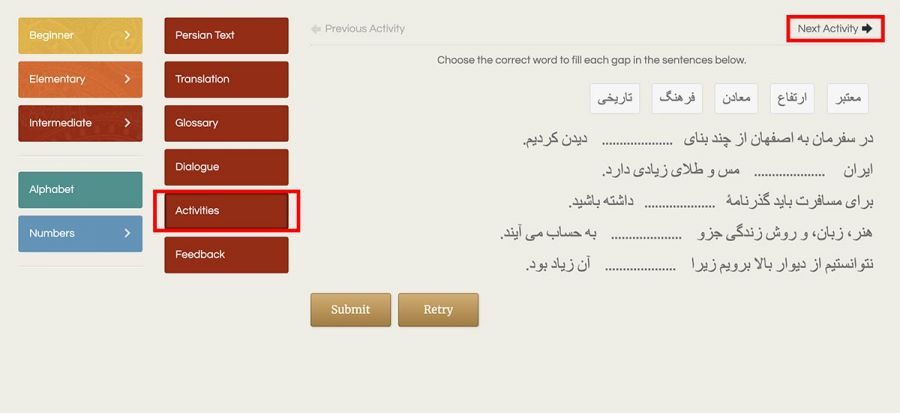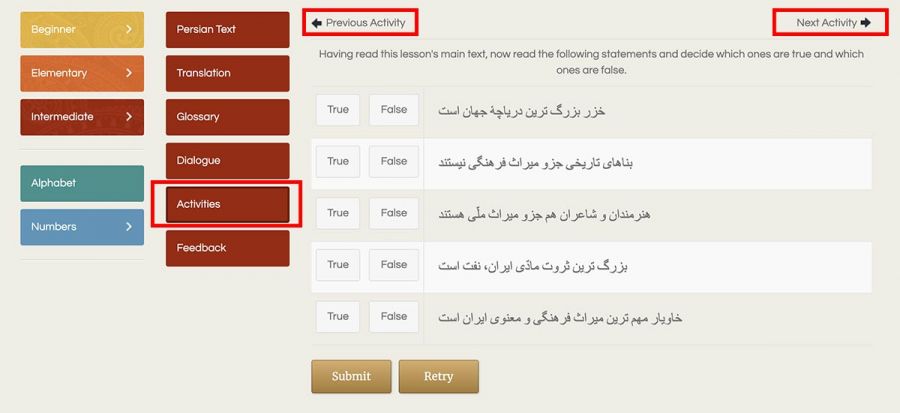
Project 6060 – Lesson 53
EN
FR
ES
FA
-
EN
Lesson 53
Satire in Persian
***
Translation
One of the literary styles in the Persian language is satire. The aim of the writer or poet of this type of writing is not just to make people laugh, but more to make a social and critical expression, to make the reader think.
Obeid Zakani is one of the Persian language’s satirical poets and writers from the fourteenth century AD and has many famous satires. His mouse and cat collection is very famous. Some compare him to an extent with the great French writer, Voltaire. Another Iranian satirical poet is Abdulrahman Jami, who lived in the fifteenth century AD. Satire was not only in his works, but also in his behaviour. Here you will read a few satires of these two Iranian writers.
The Tailor’s Apprentice
There was an individual who was the apprentice of a tailor for a few days in his childhood. One day, his master brought a bowl of honey to the shop. He wanted to go out to do something. He said to the apprentice: “There is venom in this bowl. Don’t eat it or you will die.” He said: “What has it got to do with me”? When the master went, the apprentice gave a patch of a robe to a money exchanger and got a piece of bread from him and ate all of the honey with that. The master came back and looked for the patch. The apprentice said: “Don’t hit me until I have been able to tell you the truth; A thief caught me unawares and stole the patch. I was scared that you would come and hit me and said: ‘let me eat that venom,’ so that when you came back I would be dead. I ate all the venom that was in the bowl and I am still alive.
(Obeid Zakani)
The Thief and the Pauper
A thief searched the house of a pauper in the night; the pauper woke up. He said: “Oh, man, whatever it is you’re looking for in the dark, we look for it in the light of day and can’t find it.”
(Obeid Zakani)
The Dervish and the Poor Girl
A dervish came to the door of a house. He wanted a piece of bread. A little girl was in the house. She said “We don’t have any.” He said “Where’s your mother?” She said “She has gone to offer condolences to her relatives.” He said: “From what I see of the state of your house, the other relatives should come to offer their condolences to you instead.”
(Obeid Zakani)
King Mahmoud and the Cold
One harsh winter, King Mahmoud asked someone “What are you doing wearing such thin clothes, when I am shivering even with all these clothes”.
The man said: “Oh King, do like me so you may not shiver as well.”
The king said: “What are you doing?”
The man said: “I’m wearing all the clothes that I have.”
(Obeid Zakani)
The Blind Man holding a Lamp
A blind man had a jar on his shoulder and a lamp in his hand and was going on his way one dark night. A nosy individual came up to him and said: “Oh you idiot; there is no difference for you between night and day, and light and darkness are the same as each other. Why are you carrying a lamp?”
The blind man said: “I picked up the lamp so that a blind-hearted individual like you wouldn’t bump into me and break my jar!”
(Jami)
More Generous than Hatem
Hatem Taei was one of the richest and most generous Arabs when Islam first appeared.
One day, some people asked Hatem, “Have you ever seen someone more generous than yourself?”
Hatem said: “Yes, one day I went to somebody’s house and he only had ten sheep. Straight away, he killed a sheep, cooked it and brought it to me. I ate a cut of it and really liked it. I told him that that section of the sheep was really delicious.”
Hatem continued: “That man went outside and killed the sheep one by one and cooked that section and brought it to me, without me realising. When I came outside to get on my horse, I saw that there was loads of blood spilt outside the house. ‘What is this?’ I asked. And the people said that he had killed all his sheep. I rebuked him, asking why he had done such a thing. The man replied, “If you like something that I own, I will never be stingy with it.”
So the people asked Hatem: “What did you give him in response to that?”
Hatem said: “Three hundred camels and five hundred sheep.”
They said: “So that makes you more generous than him!”
Hatem replied: “Not at all! He gave all that he had but I only gave a little of that which I had.”
(Jami)
As you have read above, Persian satire is not just for making people laugh, but in expressing these things, the writer intends to make a specific social point and make the reader think.
-
FR
Leçon 53
Satire en persan
***
Traduction
Coming soon
-
ES
Lección 53
Sátira en persa
***
Traducción
Coming soon
-
FA
درس پنجاه و سوم
طنز در فارسی
***
متن فارسی
یکی از گونه های ادبی در زبان فارسی طنز و لطیفه است. هدف نویسنده یا شاعر از این نوع نوشته فقط خنداندن نیست بلکه بیشتر برای بیان یک نکتۀ اجتماعی و انتقادی است تا خواننده را به فکر بیاندازد.
عبید زاکانی یکی از شاعران و نویسندگان طنزپرداز فارسی زبان در قرن چهاردهم میلادی و دارای لطیفه های بسیار معروف است. مجموعۀ موش و گربۀ او شهرت بسیاری دارد. برخی او را تا اندازه ای شبیه به نویسندۀ بزرگ فرانسوی ولتر می دانند. دیگر شاعر طنزپرداز ایرانی عبد الرحمن جامی است که در قرن پانزدهم میلادی می زیست. طنزپردازی نه تنها در آثار او بلکه در رفتار او نیز وجود داشت. در اینجا چند لطیفه از این دو ادیب ایرانی را می خوانید.
شاگرد خیّاط
فردی در کودکی چند روز شاگرد خیّاطی بود. روزی استادش کاسۀ عسل به دکّان برد. خواست که به کاری رود . به شاگرد گفت: در این کاسه زهر است. نخوری که هلاک شوی . گفت: من با آن چه کار دارم؟ وقتی استاد رفت، شاگرد وصلۀ جامه ای به صرّاف داد و تکّه ای نان از او گرفت و با آن تمام عسل را خورد. استاد باز آمد، وصله طلبید. شاگرد گفت: “مرا نزن تا راست بگویم، حال آن که من غافل شدم دزد وصله را ربود. من ترسیدم که تو بیایی و مرا بزنی، گفتم: زهر بخورم تا وقتی که تو باز آیی من مرده باشم. تمام آن زهر را که در کاسه بود خوردم و هنوز زنده ام .
«عبید زاکانی»
دزد و فقیر
دزدی در شب خانۀ فقیری می جست، فقیر از خواب بیدار شد. گفت: ای مردک آنچه تو در تاریکی می جویی، ما در روز روشن می جوییم و نمی یابیم .
«عبید زاکانی»
درویش و دختر فقیر
درویشی به در خانهای رسید. تکّه نانی خواست. دختركی در خانه بود. گفت: نداریم. گفت: مادرت كجاست؟ گفت: برای تسلیّت خویشاوندان رفته است. گفت: چنین كه من حال خانۀ شما را میبینم، خویشاوندان دیگر باید برای تسلیّت شما بیایند.
«عبید زاکانی»
سلطان محمود و سرما
سلطان محمود در زمستان سخت، به کسی گفت كه “با این لباس نازک در این سرما چه می كنی كه من با این همه جامه می لرزم؟” گفت: ای پادشاه، تو نیز مانند من كن تا نلرزی.
پادشاه گفت: مگر تو چه كردهای؟
مرد گفت: هرچه جامه داشتم همه را پوشیده ام.
«عبید زاکانی»
نابینای چراغ به دست
نابینایی در شب تاریک سبویی بر دوش و چراغی در دست داشت و به راهی می رفت. شخصی فضول به او رسید و به وی گفت: ای نادان شب و روز پیش تو یکسان است و روشنی و تاریکی برابر. چرا با خود چراغ حمل می کنی؟
نابینا گفت: این چراغ را برای این برداشته ام تا یک نفر کوردلی چون تو تنه نزند و سبوی مرا نشکند!
«جامی»
بخشنده تر از حاتم
حاتم طایی یکی از ثروتمندترین و بخشنده ترین اعراب در اوایل ظهور اسلام بود.
روزی عدّه ای از حاتم پرسیدند که “هرگز از خود کریم تر دیده ای؟”
حاتم گفت: بلی، روزی به خانۀ کسی رفتم و وی فقط ده گوسفند داشت. فوراً یک گوسفند کشت و پخت و پیش من آورد. من قطعهای از آن را خوردم و از آن قطعه خیلی خوشم آمد. به او گفتم که آن قسمت گوسفند بسیار خوش مزه بود.
حاتم ادامه داد: آن مرد بیرون رفت و یکی یکی گوسفندان را میکشت و آن قسمت را می پخت و پیش من میآورد و من از این موضوع آگاهی نداشتم. چون بیرون آمدم که سوار اسبم شوم، دیدم که بیرون خانه خون بسیار ریخته است. پرسیدم که این چیست؟ مردم گفتند که وی همه گوسفندان خود را کشته است. وی را سرزنش کردم که چرا چنین کرده است. آن مرد پاسخ داد: اگر تو از چیزی خوشت آید که من مالک آن باشم، هرگز در مورد آن خساست نکنم.
سپس آن عدّه از حاتم پرسیدند: تو در مقابل آن چه دادی؟
حاتم گفت: سیصد شتر و پانصد گوسفند.
گفتند: پس تو کریم تر از او باشی!
حاتم در جواب گفت: هرگز! وی هر چه داشت داده است امّا من فقط اندکی از آن چه داشتم را دادم.
«جامی»
همانطور که در بالا خواندید، لطیفه های زبان فارسی فقط برای خنداندن نیست بلکه نویسنده با بیان برخی از آن ها قصد دارد یک نکتۀ اجتماعی خاص را بگوید و خواننده را به فکر اندازد
DIALOGUE
DIALOGUE
DIÁLOGO
مُکالِمه
-
EN
Translation of Dialogue
Bahman: Have you read the story of the dervish and the poor girl?
Maryam: That one where the dervish goes and knocks the door of a girl’s house and asks for a piece of bread?
Bahman: Yeah.
Maryam: Yeah, I’ve read it but I didn’t like it.
Bahman: Why?
Maryam: Well, it wasn’t funny at all.
Bahman: Well, some satires aren’t funny, but they make a social point.
Maryam: That’s right, but I prefer funny satires. -
FR
Traduction de Dialogue
Coming soon
-
ES
Traducción de Diálogo
Coming soon
-
FA
متن فارسی مُکالمه
بهمن: داستان درویش و دختر فقیرُ خوندی؟
مریم: همونی که درویشِ می ره در خونۀ یه دخترُ می زنه و یه تیکّه نون می خواد؟
بهمن: آره.
مریم: آره، خوندم، امّا خوشم نیومد.
بهمن: چرا؟
مریم: خُب اصلاً خنده دار نبود.
بهمن: خُب، بعضی از طنزا خنده دار نیستن، ولی یه نکتۀ اجتماعی دارن.
مریم: درسته، امّا من طنز خنده دارُ بیشتر ترجیح می دم.
